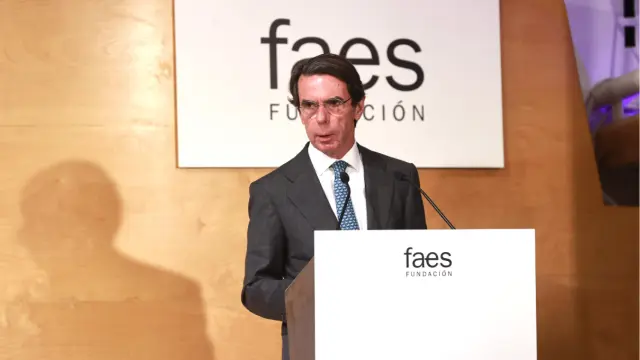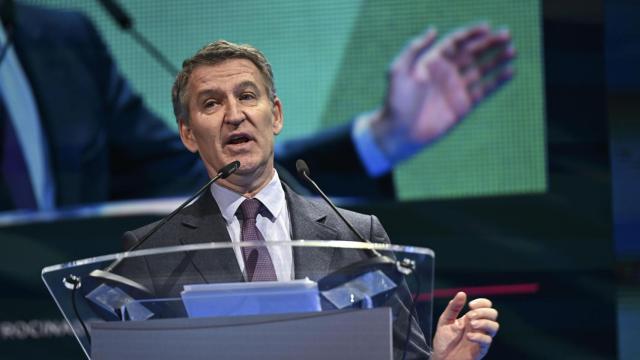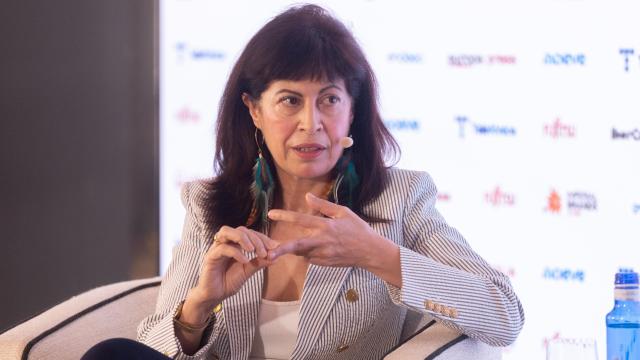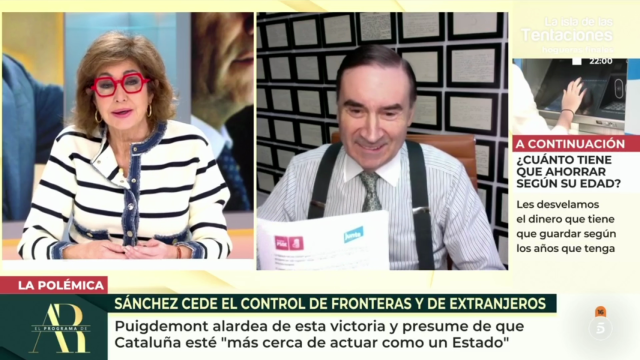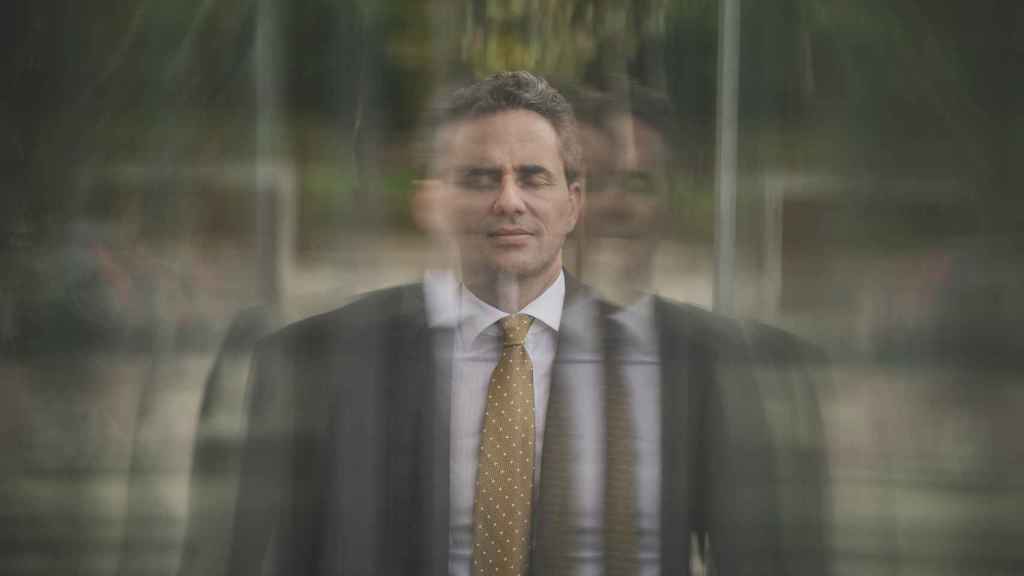
Jamil Anderlini, editor-in-chief of 'Politico.eu', interviewed in Madrid by EL ESPAÑOL.
Jamil Anderlini: "From 0 to 10, I see the chances of a World War III at 6 or 7"
"In Brussels there is nervousness with a possible democratic retreat in Spain, with Meloni they are calmer" / "There is deep anguish in Brussels in the face of a Trump's return, but his first term strengthened the EU" / "Sanchez's five days were almost populism, no one in Brussels took him seriously".
2 junio, 2024 03:30Jamil Anderlini (Kuwait, 1977) is a New Zealander, with Italian and British origins in his distant ancestors, and although he directs the information bible of the European Union, he feels partly a newcomer to the old continent. It is not in vain that he was appointed director of POLITICO.eu in 2021, after spending 22 years living in China, working essentially for the Financial Times and after growing up in the Middle East.
Although precisely for that reason, among other things, he was chosen for the position. Politico is not a newspaper, although it has a printed edition that comes out every Thursday - the day when the European neighborhood of Brussels is socially bustling, in Luxembourg Square outside Parliament.
Nor is it a web publication that imitates the old political magazines. Because to the great analyzes it adds long-range exclusives such as the main revelations of the Qatargate, or more local ones, such as a casual conversation with Carles Puigdemont in which the escaped former president, having just agreed on the amnesty, confessed to one of his journalists that he would be delighted to bring down Pedro Sánchez once the draft became law.
Anderlini has traveled to Madrid this week, to participate in a famous annual secret meeting of powerful people from around the world. "It's my first time, I can't tell you anything yet," he explains, smiling. Afterwards, I couldn't either, of course.
We sit in a bar with a terrace in the Mirasierra neighborhood in Madrid, when he has just landed, and he attends to EL ESPAÑOL longer than he should... he arrives late for the first appointment at the hotel that is hosting this convention, surrounded by almost more police officers who, a few kilometers away, ensure that for Taylor Swift goes all too well.
He speaks English with an Oxford accent, and has no opinion on Brexit. He puts on his "non-partisan hat" and refuses to choose between scare and death, far right or far left. But he knows Europe inside out, although he is not European, and explains, dispassionately, what the challenges of the EU are and why the Spain of "the fading star", Pedro Sánchez, "generates nerves in Brussels."
In recent years -almost coinciding with the European legislature that is ending- and under his command, the European version of the publication born in the US has established itself as the source that confirms and gives credibility to what is happening in the EU... if Politico publishes it.
Jamil Anderlini, director de Politico: "De 0 a 10, la posibilidad de la III Guerra Mundial la veo en 6 o 7" Foto: Javier Carbajal Video: Cristina Villarino Edición: Ani Ardoiz
As editor-in-chief of 'Politico', do you perceive what is said about the extreme right advancing in Europe? You came to office in 2021. Have you noticed this growing populist wave?
Yes, absolutely. I mean, this is the big story of this election where we're now very close to the June 9th. And the big story for us is about the rightward shift and even the far right, the hard right... It is something we can see in many parts of the world, and interestingly, not in every part of Europe, but a majority. Particularly, I would say, Western Europe.
It is a phenomenon. If you look in France, in Germany, here in Spain, it's very clear...
...and in Italy!
Yes, Italy. The far right parties are going to get an unprecedentedly high share of the vote, according to the latest pollings. Now, we know that polls in the last decade or so have been less than reliable. We're hoping they're going to be more reliable. At Politico we have 'the poll of polls', where we try to aggregate everything that's out there and sort of give you a sense.
But, all indications for now are that the entire Parliament, the entire political discourse at the European level is going to shift rightwards. It is fascinating because, you know, traditionally the two largest forces in the European Union, France and Germany -simplistically, the reason that the European Union was invented, to stop these two countries going to war- in both countries the parties that are running them are going to be completely eclipsed by the far right. In France, Le Pen will take far more of the vote than Emmanuel Macron's, party. And in Germany, the AfD is going to eclipse the SPD by a long stretch.
That is a very interesting dynamic because it means that within the representatives from these two biggest countries in the European Parliament will not be in any way aligned with their government.
And how is that managed?
There is a sort of an agreement at the European level, that of the cordon sanitaire. 'We don't work with these people'. So this is really a fundamental question, I think, for the European Union and for Parliament. How does it really work when so many people vote for a political force that is unacceptable to other parts of us?
You've used the adjective 'interesting', not 'frightening'... Why in the EU is the extreme right considered more dangerous than the extreme left? Aren't both equally dangerous for democracy?
This gets to the heart of what we at Politico are trying to do, I would say. Wich is trying to be totally nonpartisan. That is unusual in media today. The traditional American media had always strived at this objectivity and non partizanship, it was kind of built into the DNA of 20th century American journalism.
Not really in the UK or the tradition I come out of, that isn't really the case. But in the American traditional media, as you know very well, you are supposed to be objective and nonpartisan. That has changed enormously also there. Now you have real polarization in the media in America. Politico is trying to achieve that non partizanship.
So, from our perspective, the far left or the far right, neither are more frightening than the other, if we are there to cover it. You see what I'm saying, we try to remain at an institutional level, neutral on the ideological background.
Is that possible?
I think it's possible at the institutional level. Definitely difficult! But at the institutional level, as in Politico, the brand, the company, the newsroom, I think it's possible. We are trying all the time, and we achieve it relatively often.
Then, at the individual level, we all have our background and, you know, it is different. I personally, spent 22 years living in China. It is not a democracy. It was an authoritarian, collectivist dictatorship; is now a totalitarian, cult of personality dictatorship... by one person.
To my mind, there is a spectrum of politics in democracies, from the far left to the far right. And where I lived most of my adult life is down here, in totalitarian systems. So for me personally, as long as these are democratic parties, even if they are putting forward positions which are not sort of acceptable to the normal Overton window in the middle, these are still within the bounds of acceptable discourse.
If you get parties that stray into 'well, I don't think we should have elections', then I think we've gone beyond acceptable discourse. Because we stand for freedom of speech, freedom of expression and democracy, the big principles. But we are not in any way aligned with the left or the right, or even the center! We are totally nonpartisan.
Mitterrand once said that 'nationalism is war'. And Jean Monnet himself, a Frenchman, was inspired by this kind of thought to offer Schuman, an alsatian born German, to be the one to name their European project: the 'Schuman Declaration'. Would you say so, that nationalism is real enemy, and that is grown from Belgium to Hungary, from Finland to Spain?
Enemy, for whom?
For Democracy... for the EU... for both.
I would separate these. For me, the European project, the thing that Schuman and the others put together, it is incredibly interesting. I think it's a fascinating experiment where you try to share sovereignty between a centralized body -or multiple bodies, frankly-, and the member states, the 27. So that experiment of European federalism, is absolutely fascinating. That's why I say 'interesting'.
Whether it is certainly not the enemy of Politico, I would say that this idea of nativism and nationalism and parochialism, is probably potentially the enemy of the European project. But we at Politico will cover it whether it fails or succeeds. We don't have a stake in this, on ever closer union or not.
I always thought as a journalist, it's a good thing to have a kind of backdrop in mind, a kind of scaffolding to kind of shape your ideas, if you see what I'm saying. And so when I worked in China for many, many years, the way I thought of the backdrop was the rise of China and the possible decline of American influence in Asia.
So that was my kind of scaffolding, my big backdrop. And every kind of decision on editorial and thinking about stories, I sort of thought about it a little bit with that in mind.
"If it is democracy, it fits from the extreme right to the extreme left; including nationalisms... I come from 22 years in China, a totalitarian dictatorship"
So, you have no editorial line.
Not at all, but a kind of an organizing framework. Like there's a big narrative, a meta narrative. Before I even came to Europe, I tried to think, what is the meta narrative in Europe? In Brussels, particularly, in the heart of the European Union? And for me, it is this idea of centrifugal and centriptal forces, if you see it. I mean, getting a bit scientific, with physics, Einstein maybe... [laughter]
I quitted physics an age ago...
Me too. Me too. I was not very good at it. To be clear, I barely remember [laughter]. But this idea, you have forces that are pulling Europe apart, and you have forces that are pulling it together. And so the idea of ever closer union, this is the more and more sovereignty to Brussels, more and more power to the European Commission -and to the Parliament, maybe one day-, versus the 'Brexit forces' or the 'politics of Brexit'... that is very much the idea of the far right, you know, let's break up Europe. Why do we even have these idiots in Brussels?
Some of them, not all of the extreme right are Europhobes.
Yeah. That's right. Look at Meloni. She has already bought in. Maybe she's a secret force to reckon from inside, right? I mean, you never know.
Or a Trojan horse.
Maybe. That's right, exactly. The Trojan horse. Maybe, but who knows? But my point is, there are these two meta forces that are at work, and they are happening simultaneously.
And the fascinating thing is you have some indications of ever closer union, you have other indications of it breaking up, and they are happening at the same time. So as journalists our job, our challenge, our interesting role is to try to decipher which one is more powerful at any time. And that, for me, is very interesting.
Spain was the scene of one of those nationalist risings, in Catalonia. And since the 2019 elections, the stage moved to the European Parliament, where a fugitive from Justice, Carles Puigdemont, took office...
He's my neighbor.
Come on! He's your neighbor.
He lives in Waterloo, very close to me.
Well, he came to European Parliament with controversy, and then he starred each speech attacking Spain... how do you inform about this? maybe with that backdrop of yours is possible that you can answer, is this a national debate exported to Brussels or is it really a European debate?
I think it taps into something, not just European. I mean, this idea of regional sovereignty is kind of a European issue on an even more micro level. But, coming back to my many years in Asia, it is also a debate almost in every country in Asia.
And it's certainly a huge debate in China. When you look at Hong Kong, where I lived six years during the uprising, in early 2020,or in Xinjiang, in Tibet, in parts of India, or the Philippines, in Taiwan... you know, these debates are live and current all over the world.
And so it is a fascinating topic. How do we cover it at Politico? We have not a huge amount, but luckily some great expertise on Spain and the Iberian Peninsula, some journalists who are native Spanish speakers or Spanish themselves. So, the model we try to use is like real local expertise matched with a more global outlook. Someone like me, who's a generalist, relatively new to Europe and not a European myself, by passport... anyway, my point is we match the very local knowledge and very local expertise, but we try to explain these quite complicated local stories for a broader audience as well.
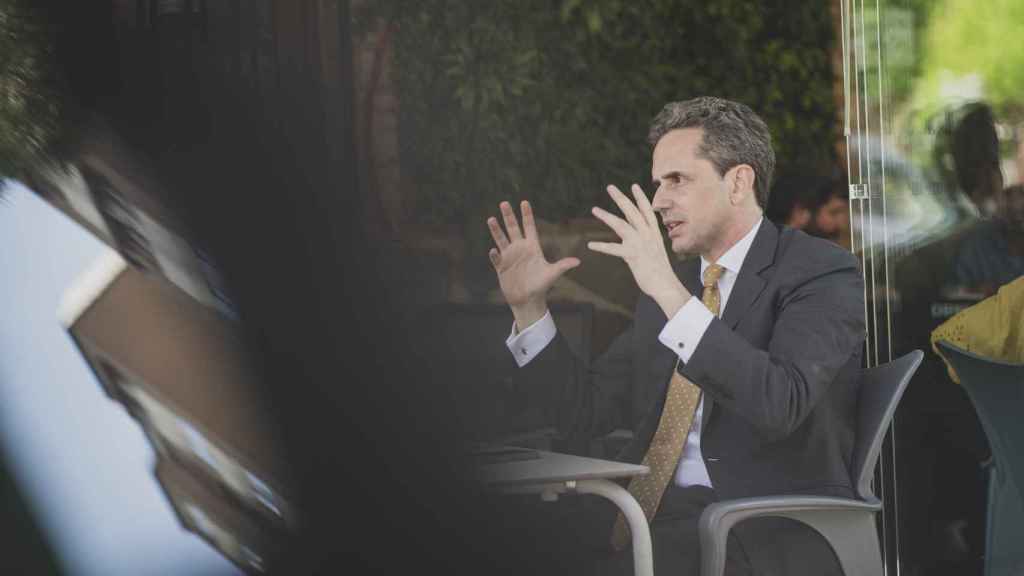
Jamil Anderlini, 'Politico.eu' editor-in-chief, interviewed by EL ESPAÑOL in Madrid.
That has a risk. And that was going to be my next question. In Spain we have suffered what is often said about foreign correspondents, who simplify the message too much to be understood from their countries. Do you feel like this has happened to 'Politico' in any way?
I don't think so. Again, I am not an expert, so it is probably more for you to judge, as a real expert in this topic.
But how do you deal with it? How do you avoid having to simplify too much an issue?
On our side, we have to think about who are the audiences, right? Like, who are we writing for? On the one hand, we would like to think that we are writing for an informed English speaking Spanish audience. We would like to think that we have something, at least some in some of our stories that would be new, interesting, a different perspective, something to make a Spanish reader who reads English, think about the topic.
We would also like to inform a Brussels audience, a European, and maybe a pan European audience about topics that are happening in Spanish politics that are relevant to them. And ideally as well -and I would say this is the hardest one for us-sometimes we would like to write the story that is still not surface level, but is also digestible, readable and interesting for a global audience... maybe US or English audience.
We at Politico, maybe slightly contrary to your your criticism of the foreign correspondents -which I think is valid, not just in Spain but globally that's a danger that foreign correspondents simplify, then exaggerate... at Politico we almost go the other direction. We are almost talking to a small audience sometimes, we have to do that. Our audience is not the whole world. Our audience is anybody who works in politics. We should be able to tell them an interesting story.
Where we find it harder is to write a story that might be interesting for someone who works in politics in Washington DC, to tell them about the Catalan independence movement.
So... your job is more to analyze than to inform.
I think it's both. And we want to also have something new, you know. But a small development that we can get from talking to Carles Puigdemont, some small little thing that he tells us might be fascinating for a Spanish audience.
Infact, you have published a really good scoop a few months ago about Puigdemont trying to conspire with some PP officials against Sánchez.
Yeah, yeah. Maybe it was not so good for Brussels audience. Maybe they were like, well, why is that new? They are not been following it so closely. And for an American audience, they would be like, who cares? So I think we are a little bit talking to different audiences. And it is a challenge, you know, it is just something we think about all the time.
This week, it has been approved an amnesty law here in Spain, with the Parliament divided into two halves. How has your media faced the entire debate since last July? Then Sánchez was saying that this was unconstitutional, against the European values and that is never going to happen. And overnight we switched the speech: I need them, I pay for it, , okay, let's do it. How can you inform about this, being objective, and explaining it to all your audiences.
Again, I would say our model is based on this insider-outsider idea that we have the people and the desire to be really knowledgeable about the topic with proper expertise, journalists who understand, who have the contacts, who have the network. But the outsider part of it is we do not take sides. We are not cheering for Vox. We are not cheering for Sánchez. We are not cheering for any Catalan independence.
Ideally, the way we cover it is from a curiosity perspective and from a sort of obsession with politics perspective. That is how we try to do it. So, I can tell you, I personally have been many times called by Spanish officials, in the Prime Minister's office and others, yelling at me, very upset, maybe.
I try to be very polite, but very firm, you know. And it is very interesting, how upset people get. And it's not just Spain. I would say it's funny how different the approach is. And I don't want to get into sort of cultural, national stereotypes. But there is a difference!
There is a difference from the Spanish authorities when they call me to complain about a story, or maybe the Greek authorities, or the Germans or the French, the Luxembourgish or the Belgians... every country is a bit different in their approach. And funnily enough, countries I thought of as very democratic seem very authoritarian in their approach to the press.
And I'm not talking about Spain now because I'm too polite, since I'm in Spain [laughs]. But some of these countries, and I won't name them, are just 'we like nice things about my leader, how dare you not?' And we're going to threaten you in some ways'... It is very interesting! And they are not the ones you think. It is not Hungary -they just don't talk to us. But other governments you think of are very much more democratic, they are really not very nice to the free press, I would say.
In the objective challenge that you face every day, have you detected, as the EPP says, that Pedro Sánchez has lost much of his prestige in Brussels in the last couple of years? Is that real?
I would say that, Sanchez was seen as a real sort of rising star. Is my impression. So I have colleagues who are much more expert in the topic and been here much longer and seen his rising. I would say that he had a sort of sense of on-the-rise kind of politician.
And, I think that the last election certainly, weakened him, obviously. It was unclear that he was going to be able to form a government, and the polls really turned on him. And then, that does damage to your credibility in Brussels always. Because if I, as Ursula von der Leyen, or Charles Michel, or Olaf Scholz, whatever... if I am not sure that you're going to even be there, you know, around the table, why bother investing in this relationship? Maybe you'll be gone. So, you know, whatever. See you later.
"Sánchez had the image of a rising star in Brussels, but the last elections weakened him... local politics weigh more than European politics, and no one understands what about his wife"
I think that domestic politics always comes first for the Member States. For the countries in the EU, domestic politics is always much more important than actually the Brussels politics. So, things that make sense in the domestic political context don't necessarily make sense to a Brussels audience.
I mean, the idea that you are being attacked for something maybe your wife did, and that you say 'I'm going to think about whether I'm going to resign for 4 or 5 days'... maybe it makes sense in a Spanish political context. But to somebody who's a novice in Spanish politics, it looks ridiculous...
...here in Spain, more or less half of the country, thought the same.
Maybe half the country, yeah. I think in Brussels, that was a from what I was hearing, it was a topic of humor. Like people making fun of that. Like, what is it like? What is he doing? You know, this is grandstanding. This is almost populism. And also nobody expected him to step down at all...
...nobody?
Not at all! I mean, I don't talk to everyone in Brussels, so I don't speak for Brussels. For sure, no one would expect me to, but people I talk to in sort of passing was like, the guy is never going to step down.
Germany is not growing, France refuses to energetically interconnect the north and south of Europe, in Italy stability is provided by a neo-fascist, in the Netherlands there is a xenophobe in power, Belgium remains divided... as always, what hope do we have left in the European Union?
I think that this next Commission for the next five years, once it's decided in the next few months, has a monumental challenge. Many people have written the obituary of the European Union, but I don't think it's out of possibility that you would have, you know, a break up or more countries leaving the European Union.
We've seen Britain with Brexit. It's been shown to be possible, technically possible. So maybe you see more countries want to leave, maybe the whole thing starts to get much more weak? That's a possibility, especially when you think about the parties that are gaining strength. Many of them are euroskeptic! Their platform is like, I want to get elected to this thing so I can destroy this thing.
It was always very interesting to me that the only place that Nigel Farage from the UK could be elected is the very place he's trying to destroy. He never has been elected in the UK ever. Marine Le Pen couldn't get elected in France, but she got elected to the very thing that she was trying to destroy for so long. That is a fascinating irony, a paradox.
Maybe that's the greatness of the European Union.
My background is as a financial and economic journalist for most of my career. And the thing that worries me possibly the most is the economic problems in Europe that I've seen. You know, banking union, capital markets union...
...innovation...
...yeah. I mean, but I don't think you can even start to talk about innovation until you have proper funding models, when most of your money comes from local banks. If I am a small business owner, I have to go talk to my local bank to get a loan, and they can only give me this margin. And if my father didn't know the bank manager for the last 50 years, then maybe I don't get the money.
This idea is crazy and there is no venture capital to speak of. Even innovative financing models are limited. And in early stage.
Maybe the two main issues that the EU needs to improve are security and defense and how to fund the digital and energetic transitions.
It is not a nice thing to say, but from an economic point of view, the defense industry is going to be helpful to the economy. It is not nice when you are talking about people dying, but from an economic perspective, that is actually an area that is boosting the the European economy for now, unfortunately. And the especially the American economy.
But as I say, the funding models, the banking union, capital markets union, these has to be top of the agenda for the next Commission. How to foster real innovation, how to be thinking about the technologies of the future, you know, the AI and all these things.
In a way it is something boring to talk about because everyone talks about it all the time, but where are the results? I don't see that much innovation compared to the United States or even to China or other places. So, I think that the European Union has a really monumental challenge coming. And the countries, the individual countries.
Talking about money... have the Next Generation funds failed? They were implemented for the recovering after the pandemic, but also to face that modernization that the European Union needs to face. Have we lost this race also?
I think there's a danger that Europe falls too far behind when it comes to technology and innovation. Europe does have great strengths, you know, cultural, historical. You can feel it in some parts of Europe, this energy and excitement. I was just in Poland a couple of weeks ago, and you could feel a real sense of dynamism and optimism. So it's not uniform across Europe. I would say that it's Western Europe that feels like a bit sort of slow and kind of...
"The next Commission has a monumental challenge, I do not see a breakup or more countries leaving the EU as impossible"
...an elder Europe?
Maybe a bit of elderly. Yeah, this sense of aging population. Decline maybe is too strong a word. But no, you know, a little bit decline. You get that sense of feeling and I think that's of concern. You need to sort of spark things up, but at the same time, there's this great strength... . It is a very pleasant place to live in many ways here.
The other big issue, foreign policy... this week, Spain, Ireland, Slovenia and Norway, recognize the Palestinian state against the opinion of the majority of the european countries. What consequences these have for Europe's personality and weight as an actor in the Middle East? Useful for peace, authority in Human Rights and SDG, commercial weight... Has Europe also lost this race?
Okay, it's an interesting one. I won't say the name of, but right after October 7th, I was meeting with a very senior person in the European Union, an official. And they said, this is really hard for us. On the one hand, when Vladimir Putin launched the full scale invasion of Ukraine, this was very easy for the EU, this immediately brought the entire union together, and they acted in with unprecedented speed and unity.
We have an enemy!
Yeah, right! We have an enemy and it's an enemy we all agree on. It's Russia, you know, imperialism. That immediately brought everyone together. It was a terrible moment, you know, but also it was actually a strengthening and from a European unity and acting strong, it was a good thing. It was good for the brand, let's say maybe. Bad for humanity, good for the European Union brand.
But the October 7th and then the consequent war between Israel and Hamas, that conflict is the opposite. It is crippling for the European Union and its authority and its ability to form consensus.
Yes, you have Ursula von der Leyen saying one thing, and then Josep Borrell sepeaking just the opposite...
Yes, that's it. They were totally divided, even within the top officials, you have a Spanish socialist saying one thing, a German conservative saying the total opposite. And then, a wavering Charles Michel... a sort of Belgian prime minister.
Yes, the perfect belgian politician.
Who knows what he says? Or what he thinks? So you have something that really, really divides. Not being too strong about it, I would say that European Union has no credibility in the Middle East whatsoever, except, on a national level, as a source of funds for different actors.
But that does not mean that the EU does not have a credible voice in other theaters, other areas. I think in Africa, the European Union has a bit more credibility than in the Middle East, a little bit.
Do you think so? I mean, from my point of view, Russia is occupying that position.
Well, in some areas. In some parts of Africa, there is real hesitance to get into bed with Russia, a real reluctance. Many governments are very happy to take Russian military assistance but they don't have such a glorious history in Africa either.
Neither does Europe. Let's be clear. But it depends which part you're talking about. And I would say that in Washington the EU still has some weight. With this administration, much less with the one before...
Well, the EU is also a kind of manufacturing worked by them...
Yeah. I mean, I just think that the European Union still has this power, of course.
Soft power.
Yeah, soft power. And it still has this attraction. I don't think it always lives up to its concept of superpower values and all of this because actually, when it comes down to it, you see them trading that away quite quickly in some areas. But at least the rhetoric is very appealing.
There is this idea of human rights. And we stand for it, we're a peace project and we're, you know, the superpower values. I like it.
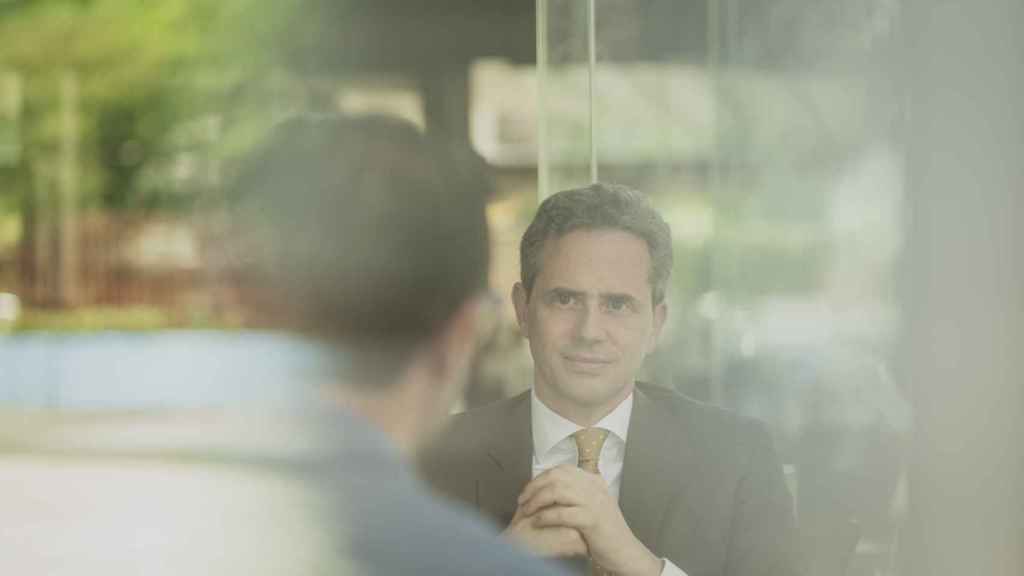
The editor-in-chief of 'Politico.eu', Jamil Anderlini, during his interview with EL ESPAÑOL.
Do you see possible that the next Commission fosters something as a common foreign and defense policy, really common?
Look, there are a lot of discussions going on. There is a possibility that you get more power concentrated in the Commission, when it comes to trade in foreign affairs, a bit more power. The proposal for a Defense Commissioner is a very interesting one. I think it's quite likely to happen, actually, the idea of creating a Commissioner for Defense, whether that Commissioner has any power whatsoever, whether it's such a limited role that it is.
The High Representative still has no power at all...
...I have talked to Von der Leyen and she says something about, you know, we maybe need to look at this High Representative job. Because on the one hand, when it suits them, they are part of the Commission, and when it suits them, they are part of the Council!
And do they have any real power beyond giving press conferences? It is unclear. Maybe started off with more power, ranking number two in the Commission, then it was ranking three, and then it was ranked five... and like this is going to be ranked number 20! Or who knows.
So it iss one of the fascinating things to me, because the European Union is so young! So, so young. The Lisbon Treaty is just like yesterday! And some of these countries came in less than 20 years ago. They kind of making it up as they go along. It's not like these are sort of, these are the time and the traditions and we never change.
In a geological view, of course, it's very young.
And it's not set in stone! You could have another Treaty tomorrow. Because it is like, well, this doesn't work, let's try again. And frankly, if we are really honest about it, some of the rules and regulations that they have even for themselves, like on transparency, even on expenses on very supposedly minor, but quite telling things they don't pay attention. And legislation that is proposed by the Commission and passed by the Parliament oftentimes is not written into the law books for many, many years, if at all, into the national governments.
There is a sort of tortured process here. It is this grand experiment which is admirable and fascinating and exciting, but I think it's too early to say whether it will succeed, and by its own terms.
Will there be expansion to the Balkans and other countries in the next mandate? Will a convention be called to change the Treaties? Can or should the EU face this process of reinvention?
Who knows? It will really depend on who is in this next Parliament and then how do they veto or approve the people in the Commission. The Parliament does have a sort of moments of quite a lot of power where they can block, using the veto power to the Commissioners. I mean, then their power diminishes for five years. This top-jobs period, which is coming up, is like political sort of moment when they really shine. This moment will be very interesting to see.
So if you get a Parliament that is dominated or somewhat dominated by the parties that want to break up the whole thing, can you really see a scenario where they allow countries that are going to be very disruptive to join the Union? I mean, it is too early to say that. It would be fascinating to see.
Is it Donald Trump's foreseeable victory in the United States, more a risky due to his isolationism, his populism, or because Europe is not prepared to be a major player in the world and confront by herself against Russia.
Put it this way, there is a deep angst and paranoia in Brussels and across Europe, about the prospect of another Trump presidency.
Because we know what he did during his first time in office.
Although, to to put my nonpartizan hat on and to argue the other side, he certainly managed to scare European countries, many of NATO member countries to raise their defense budgets. And...
...he forged the Abraham Agreements.
And some of the things that he maybe unintentionally did, actually strengthen Europe and in some ways, the transatlantic alliance, if you see what I mean. So in some ways, does this Donald Trump hate the European Union? Maybe. Does he think about it that much? Probably not that much.
Does he hate NATO? No. If you listen to what he actually says, he hates the idea that in his mind -very simplistic in some ways-, America is subsidizing Europe and paying for the defense. But in some ways, he is right, America is certainly underwriting the security of Europe.
Because maybe we are a 'buffer zone' for America.
Well, maybe it is relatively cheap for America to extend the nuclear umbrella over here. And by the way, does that serve the goals and the aims of American foreign policy? Of course it does! Because Germany doesn't have nuclear weapons officially.
Nobody else is supposed to have nuclear weapons on the European continent. And that's only because America provides it, but that is in America's interests. And for Pax Americana, global peace is avoiding nuclear war, which is certainly one of America's foreign policy goals. That helps!
And also, go talk to the average AfD voter. They will say, we are a colony, we are colonized by America, right? So it also definitely serves America's strategic and geopolitical interests to have so many military bases around Europe, to have so much deep economic ties and in the end, who benefits the most? It is much, much more complicated than Donald Trump may see it.
Yes, because he seems to think just in the short term.
And in a very syplistic transactional way. But maybe he's also tapping into that very many people in Europe who would say America should leave, you know, strategic autonomy. Emmanuel Macron says it all the time. What does he mean? Does he mean America should just abandon Europe entirely? Maybe he does! Seems a great fantasy, then France is the big power!
Returning to populism at the hands of Donald Trump. Do you think that the illiberal processes in Hungary and the one suffered by Poland are, in some way, comparable to what is happening here in Spain? The opposition denounces a decline in democracy every day...
...an illiberal democracy.
Yeah.
Like in Hungary.
That is the type of concept that the opposition in Spain denounces. Has that approach reached Brussels? That perhaps Spain is falling into some type of illiberalism?
I would say I'm not an expert in Spanish politics, clearly.
Well, maybe that is why I ask you. Someone involved in politics, who lives in Brussels, and is not an expert... could well be the perfect canary in the coal mine.
Yeah, sure. Canary in the coal mine... I would say that in, in Brussels, there is a deep fear across the board on this kind of backsliding and shift towards illiberal democracy everywhere in Europe. The focus is on Hungary and previously Poland and countries like Slovakia. In Poland, the fear for Brussels is now optimism, because there has been a sort of shift back to someone they love and know very well, Donald Tusk.
Spain has been a place that people point to, along with Germany and France and others. Also a little bit Italy, although people feel in Brussels much more comfortable with how Giorgia Meloni has behaved once she got into office, they feel like she is actually maybe one of us and we can work with her and it's fine. So I would say that, yeah, there is a nervousness, but not a panic like you get maybe around the AfD or around Hungary... there's a sort of mania around Hungary.
"Does Trump hate the EU? Maybe. Does he think about it a lot? Probably not. Does he hate NATO? What he hates is that the US pays for the defense of Europe... but in a way, he's right."
Well, nobody believes that the AfD will be in power.
Yeah, but Marine Le Pen could be in office.
That's true.
And, I mean, she's in the minds of Brussels and the Brussels Eurocrats. She is not as bad as the AfD, that could be quite powerful in this next Parliament, with the polling much higher over the Olaf Scholz party.
We are finishing... let me summarize the challenges of Spain, Europe and the world in a single question. The Amnesty Law approved this week in Spain prevents the judiciary from continuing its investigations into Russian interference in the destabilization of Europe, specifically here in Spain in 2017. Can the Commission or the European Courts do something to prevent this?
To prevent Russian interference?
To prevent Spain to stop this investigation.
I think that this sort of competence is very difficult for the European Union. Basically the idea of fighting foreign interference, whether it's Russia, China, America, Britain, whatever... is really left to -by design, but also to the deep frustration of people of Brussels-, it is left to the national governments in Europe.
And so, the European Union institutions and the Courts find it very difficult to deal with it, and effectively don't deal with it. The EEAS, the EU Foreign Affairs department, has a very limited ability to do counterintelligence. It is very weak and after the UK left the Union, I would say that the capabilities of those kinds of agencies and institutions were weakened considerably as well.
You have lived and worked for many years in China. Is Xi Jinping a rival who will become an enemy?
I don't know. Well, I think that Xi Jinping himself believes that he is in an existential battle with the West, with the idea of the West. I mean, liberal democracy, particularly America and the American led global order. I think he sees these things as great threats to him and to the Communist Party. And so he sees these as his enemy.
And if someone sees you as the enemy, even if you don't see them as the enemy, eventually they become your enemy. That's just how it happens. So that's how I see it.

Jamil Anderlini, editor-in-chief of 'Político.eu', with Alberto D. Prieto, deputy director of EL ESPAÑOL.
And lastly, from 0 to 10, please let me know. How possible do you see a World War Three?
World War Three? I think it is 6 or 7.
6 or 7!
Ten being like certain, yes. Zero being nothing, no chance.
I really didn't think you'd answer that. Do you want to elaborate on this?
We may be already in the early stages. You can take history, what do they say? History doesn't repeat, but it rhymes. So, yeah, I think there's a similarity today between where we are at and where we were pre World War One, where you have, let's say a, sort of fading empire Russia, with that sort of lashing out. That is like the Austro-Hungarian Empire.
And then you have a rising but very fragile, very brittle, and very paranoid rising power, which is Wilhelm in Germany in the first example, and China today. And they are in an alliance. And the aging, decrepit, declining empire could easily pull the rising one into a war that it does not want.
And, you know, the flashpoints of Taiwan, but also many others for China. They have many territorial disputes around them and countries that hate them. They hate those countries, and they claim large areas of many their neighbors territory.
And America is to a certain extent like the United Kingdom in that period. A little bit threatened, a little bit declining, a little bitnot sure of its place. 'Are we going to be really declining? Are we going to be rising again like a Phenix or, you know, like populism?'
'We are still the empire, but we don't know tomorrow'.
Yeah, that's it. And we are still the big dog. But are we going to be a little dumb? So, I think there are some parallels, it's not one for one, but I think there are. And we are just in one of those periods of history where history is, you know, accelerating every day.
